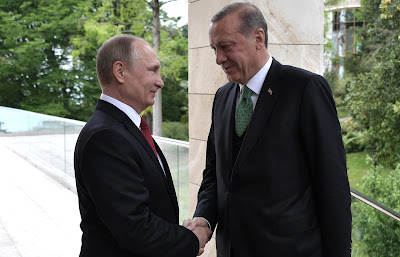Ben Aris
Putin’s ultimate goal seems to be to win over Turkey from the West's sphere of influence
Russo-Turkish relations are back in rude health – almost. And nowhere is that clearer than in Russian gas deliveries to Turkey. They have soared in the past month.
Gazprom will set a record for natural gas deliveries to Turkey this year with deliveries having already surged 48 percent in September from a year earlier, Gazprom CEO Alexei Miller told reporters on Sept. 28.
"We are happy that deliveries of gas to Turkey are growing this year. Comparing the period from Jan. 1 to date with the like period of 2016, supplies to the Turkish market rose 24.3 percent," Miller was cited by the state-run news agency TASS as saying. "It means Gazprom will probably set an all-time high record of gas supplies to the market of Turkey as of 2017 year-end."
"Speaking about September, the winter season is coming soon. Gas deliveries to Turkey surged 48 percent in September 2017 against September of last year. This evidences once again how TurkStream [the natural gas pipeline designed to link Russia with Turkey via a route under the Black Sea] is a project that is feasible and strongly sought for," Miller added.
Putin in Ankara
Miller’s statement came as President Vladimir Putin was in Ankara to meet with his Turkish counterpart Recep Tayyip Erdogan. The visit marked the fifth face-to-face meeting between the two leaders this year with the rapprochement between Turkey and Russia seemingly in full swing now that the countries have put the shooting down of a Russian fighter-bomber by the Turkish military in late 2015 behind them.
Russia recently sold Turkey its most advanced anti-missile S-400 system to the consternation of NATO and Washington. Turkey has been a NATO member since the 1950s and is supposed to only buy systems that are compatible with NATO hardware, which the S-400 is not. It is the second arms deal Putin has cut with a NATO member, having signed off on a deal to upgrade Bulgaria’s MiGs earlier the same month.
However, it was notable that Putin and Erdogan did not refer to the deal during their press conference after their Ankara talks. Last week, while Erdogan was in New York for the UN General Assembly and a meeting with Donald Trump, U.S. media reports indicated that the transaction could be held in breach of Congress’ latest sanctions against Moscow.
Erdogan has been forced to turn to Russia given the deterioration of his relations with the European Union. During recent German elections German Chancellor Angela Merkel explicitly said that she is calling for a formal end to Turkey’s EU accession bid.
Closer ties with Moscow also make sense in light of a referendum held in Iraq this week calling for the creation of a Kurdish homeland – something Erdogan finds anathema.
But the relations are not perfect. One of the main items on the agenda for the two leaders, who spent two hours talking, was when Turkey can restart its exports of tomatoes to Russia. This is a huge business as Russia produces almost no tomatoes of its own, but Russians love the fruit. The tomato ban is among the last of the sanctions Russia imposed after Turkey shot down the Russian fighter.
However, on the more important gas imports Russia has dramatically changed its tone.
Precarious energy relations
As bne IntelliNews reported in March last year, Russia launched a gas war with Turkey after it unilaterally — and in violation of its contractual delivery obligations — cut supplies by 20 percent overnight, during the nadir of the incident with the plane.
Turkey has precarious energy relations with Russia as it has no gas storage facilities of its own and relies entirely on Moscow to manage the supply of gas used in power stations. The Turks essentially ring the Russians and ask them to send more or less gas as demand fluctuates.
While executives at Gazprom Export — the export wing of state gas behemoth Gazprom — told bne IntelliNews that the decision in 2016 to cut supplies was likely to push Turkey to actively seek alternative energy sources and so damage Russia’s business in the long-term, they also said the order to do so “came from upstairs,” meaning they had no choice but to go ahead.
Now the gas business is booming and everyone seems to have put the fracas behind them. At the same time Russia is actively working on the construction of the TurkStream gas pipeline that runs along a southern route from Russia’s gas fields to reach Turkey and customers in western Europe, despite the fact that Ankara has yet to ratify the construction deal. And more recently Russia’s Rosneft said it is exploring the possibility of building a 30bn cubic metre (bcm) pipeline that would from 2020 deliver natural gas supplies from the Iraqi Kurdistan region to Turkey.
Putin’s ultimate goal seems to be to winkle Turkey out of the West's orbit and bring it into his own sphere of influence. If this is the case then he is registering considerable success.
SOURCE
